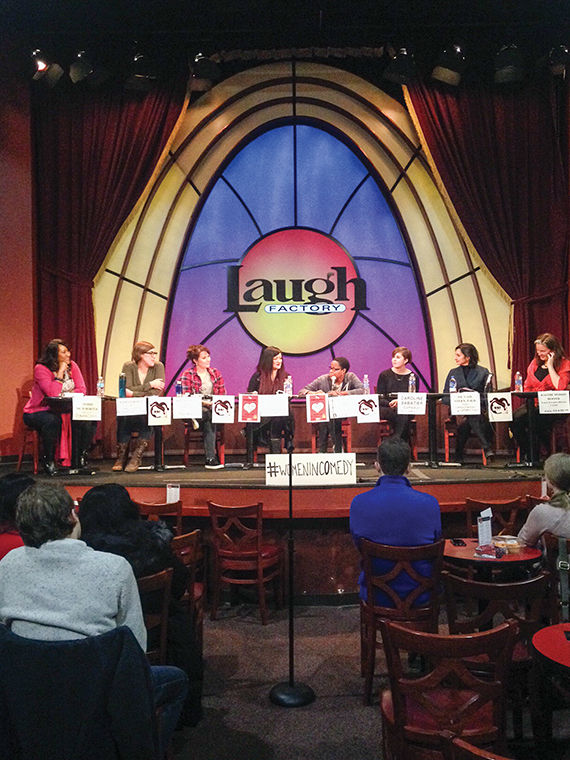Females in comedy industry tackle sexual harassment
Female comedians and assault educators were part of a panel Jan. 31 at The Laugh Factory, 3175 N. Broadway and discussed solutions to harassment.
February 8, 2016
When Caroline Sabatier went to the police to report her harassment by a male authority figure from her improv group, she did not receive much help. The Chicago comedian realized she needed to take matters into her own hands, and started publicly discussing the issue no one wanted to talk about—female sexual harassment in the comedy community.
Sabatier joined other local female comics in telling their stories about being sexually and verbally harassed in the comedy workplace. Sabatier said the offenders are often the same men who have not received any admonishment because no one wants to bring the issue to light.
“I got to the point where I was very frustrated because everyone knows [about the harassments] and I don’t know why nothing has been done,” Sabatier said.
The police did not follow her case, but Sabatier said she learned she has nothing to be afraid of in sharing her story. Now, the female comedic community has legal support. Kaethe Morris Hoffer, executive director of the Chicago Alliance Against Sexual Exploitation, is supporting the movement to discuss harassment.
“The primary work that needs to be done is inside that community to articulate the standards they want to have for themselves,” Morris Hoffer said.
The law exists to offer a platform to create these standards for workplaces, she said, and CAASE helps those who have experienced sexual assault violation.
Victoria Elena Nones, executive director of Women in Comedy, a nonprofit organization whose mission is to bring women in comedy together through professional opportunities, said the movement, dubbed with hashtags like #WomenInComedy and #MadFunnyWomen on social media, is one way people can work toward changing the cultural norm of sexual harassment.
“We are trying to act as a facilitator to helping people create change,” Nones said.
Sabatier and Nones wanted to host a blackout to raise awareness and boycott local theaters on behalf of people who have left the industry because they were hurt by someone in it, and did not feel they had a choice but to leave.
Sabatier planned to hold the boycott on Feb.1, but after much debate and backlash from local comedy groups including iO’s improv jam who did not want the boycott to detract from their show, the group moved the event to Jan. 31 and changed it to a panel discussion hosted by Women in Comedy, one of many to come, Nones said.
Sabatier said the event was too important to cancel and even if it was compromised, it was a discussion worth having.
The public panel was held at the Laugh Factory, 3175 N. Broadway, and featured eight female Chicago comedians and harassment educators speaking about the treatment of women in the community and solutions to fix the problems.
With all the heightened energy and backlash surrounding the topic, Nones said the panel was a good way to defuse it and focus on a common goal.
“Having discussions face to face is a great way to gain knowledge and resources,” she said.
Morris Hoffer, one of the educators on the panel, shared her excitement to see this conversation finally happening.
“Often the most silent allies don’t know what role to play and are worried about taking a stand,” Morris Hoffer said. “People who stand up are doing something really scary and need support to stand with them.”








